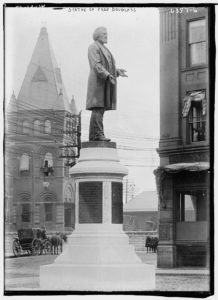150 years ago this month an article about Reconstruction by Frederick Douglass was published in The Atlantic Monthly. In the first section Mr. Douglass asserted that the only way to protect the rights of ex-slaves in the South without creating a despotic federal government was to ensure that the ex-slaves had the right to vote.
From The Atlantic Monthly, VOL. XVIII.—DECEMBER, 1866.—NO. CX:
RECONSTRUCTION.
The assembling of the Second Session of the Thirty-ninth Congress may very properly be made the occasion of a few earnest words on the already much-worn topic of reconstruction.
Seldom has any legislative body been the subject of a solicitude more intense, or of aspirations more sincere and ardent. There are the best of reasons for this profound interest. Questions of vast moment, left undecided by the last session of Congress, must be manfully grappled with by this. No political skirmishing will avail. The occasion demands statesmanship.
Whether the tremendous war so heroically fought and so victoriously ended shall pass into history a miserable failure, barren of permanent results,—a scandalous and shocking waste of blood and treasure,—a strife for empire, as Earl Russell characterized it, of no value to liberty or civilization,—an attempt to re-establish a Union by force, which must be the merest mockery of a Union,—an effort to bring under Federal authority States into which no loyal man from the North may safely enter, and to bring men into the national councils who deliberate with daggers and vote with revolvers, and who do not even conceal their deadly hate of the country that conquered them; or whether, on the other hand, we shall, as the rightful reward of victory over treason, have a solid nation, entirely delivered from all contradictions and social antagonisms, based upon loyalty, liberty, and equality, must be determined one way or the other by the present session of Congress. The last session really did nothing which can be considered final as to these questions. The Civil Rights Bill and the Freedmen’s Bureau Bill and the proposed constitutional amendments, with the amendment already adopted and recognized as the law of the land, do not reach the difficulty, and cannot, unless the whole structure of the government is changed from a government by States to something like a despotic central government, with power to control even the municipal regulations of States, and to make them conform to its own despotic will. While there remains such an idea as the right of each State to control its own local affairs,—an idea, by the way, more deeply rooted in the minds of men of all sections of the country than perhaps any one other political idea,—no general assertion of human rights can be of any practical value. To change the character of the government at this point is neither possible nor desirable. All that is necessary to be done is to make the government consistent with itself, and render the rights of the States compatible with the sacred rights of human nature.
The arm of the Federal government is long, but it is far too short to protect the rights of individuals in the interior of distant States. They must have the power to protect themselves, or they will go unprotected, spite of all the laws the Federal government can put upon the national statute-book.
Slavery, like all other great systems of wrong, founded in the depths of human selfishness, and existing for ages, has not neglected its own conservation. It has steadily exerted an influence upon all around it favorable to its own continuance. And to-day it is so strong that it could exist, not only without law, but even against law. Custom, manners, morals, religion, are all on its side everywhere in the South; and when you add the ignorance and servility of the ex-slave to the intelligence and accustomed authority of the master, you have the conditions, not out of which slavery will again grow, but under which it is impossible for the Federal government to wholly destroy it, unless the Federal government be armed with despotic power, to blot out State authority, and to station a Federal officer at every cross-road. This, of course, cannot be done, and ought not even if it could. The true way and the easiest way is to make our government entirely consistent with itself, and give to every loyal citizen the elective franchise,—a right and power which will be ever present, and will form a wall of fire for his protection. …


